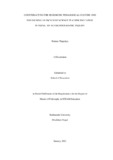
Please use this identifier to cite or link to this item:
https://hdl.handle.net/20.500.14301/306Full metadata record
| DC Field | Value | Language |
|---|---|---|
| dc.contributor.author | Thapaliya, Pratima | - |
| dc.date.accessioned | 2023-06-06T08:30:51Z | - |
| dc.date.available | 2023-06-06T08:30:51Z | - |
| dc.date.issued | 2022-01 | - |
| dc.identifier.citation | Thapaliya,P.(2022).Counteracting the hegemonic pedagogical culture and envisioning an inclusive science education in Nepal: An autoethnographic inquiry. | en_US |
| dc.identifier.uri | https://hdl.handle.net/20.500.14301/306 | - |
| dc.description.abstract | I reflected critically on my lived experiences of science teaching and learning as a student, science teacher, headteacher, and science teacher educator by reflection- on-action, reflection-in-action, and reflection-for-action (van Manen, 1991). It helped me dig out my past, present dis/empowering knowing, being, and doing cultures, and envisage the possible ways to counteract the disempowering cultures. I felt that counteracting the hegemonic pedagogical culture and envisioning an inclusive science teacher education was the researchable and emerging issue. So, I developed the research purpose to counteract the hegemonic pedagogical culture in science education, envisioning an inclusive science teacher education in Nepal. I designed four research questions and emphasized data text generation and meaning-making based on it. Emancipatory interest (Habermas, 1972) and transformative activist stance (Stetsenko, 2017) emphasize structural and individual transformation. Thus, I applied these theoretical perspectives as referents to excavate the hegemonic science II pedagogical cultures due to structures and individual beliefs and actions. Likewise, I employed a multiparadigmatic research design (i.e., interpretivism, criticalism, postmodernism, and integralism) and autoethnography as the research methodology. As an autoethnographer, I extensively focused on critically reflecting on my sociocultural, historical, and political aspects to do more evocative writing. In the process of data generation, meaning-making and expressing, I engaged in resisting, liberating, healing, and envisioning aspects of criticalism that made my writing more evocative while demystifying the hegemonic pedagogical cultures in science teaching and learning. Furthermore, I incorporated different arts-based research genres and logics such as narratives, dialectical logic, poetic reflections, and postmodernism metaphors that helped me represent my painful and gainful narratives, multivocality, and differences playfully. I also attempted to portray the emergent spatiotemporal context by incorporating the notions of interpretivism. Likewise, I applied the inclusive ideas of integralism for integrating individualized, localized, and globalized perspectives in envisioning an inclusive science teacher education. I followed the quality standard of different research paradigms like trustworthiness, crystallization, critical reflexivity, verisimilitude, and pedagogical thoughtfulness. Further, I also became conscious of the procedural, situational, and existing ethics in my entire research journey. From this inquiry, I explored that science educational practitioners' taken-for- granted beliefs, values, actions, and rigor structures like one-size-fit-all- dominated curriculum, assessment, and institutional environment is responsible for the domination of hegemonic pedagogical cultures in science teacher education. I attempted to envisage education in the emergency sensitized curriculum, pedagogy, and assessment by incorporating the curriculum integration approach (Beane, 1995) III like STEAM education and transformational outcome-based education (Spady, 1994). While doing so, I metaphorically used the Hindu trinity (i.e., Lord Brahma, Lord Vishnu, and Lord Shiva principles) in the process of envisioning transformative visions, missions, and values for nurturing the inclusive science educational culture; maintaining, preserving, and practicing core values and practices for sustaining and keeping the culture alive; and destructing or minimizing less relevant practices manifested in my organization (Typically, science teacher education program). It could assist in nurturing the inclusive science educational culture, maintaining, preserving, and practicing core values and practices for sustaining and keeping the culture alive, and destructing or minimizing the less relevant practices manifested in my organization. Further, this inquiry explored the nature of science education as inclusive (im/pure), curriculum as/for social reconstruction, pedagogy as/for the public good and circular process, and assessment as/for learning. These transformative ideas could be a catalyst for promoting socially responsible inclusive science teacher education. | en_US |
| dc.language.iso | en | en_US |
| dc.publisher | Kathmandu University School of Education | en_US |
| dc.title | COUNTERACTING THE HEGEMONIC PEDAGOGICAL CULTURE AND ENVISIONING AN INCLUSIVE SCIENCE TEACHER EDUCATION IN NEPAL: AN AUTOETHNOGRAPHIC INQUIRY | en_US |
| dc.type | Dissertation | en_US |
| local.school.name | SOED | en_US |
| local.school.department | DOSE | en_US |
| local.school.program | MPhil in STEAM Educaiton | en_US |
| local.school.level | M.Phil. | en_US |
| Appears in Collections: | Dissertation | |
Files in This Item:
| File | Description | Size | Format | |
|---|---|---|---|---|
| Print Final@Pratima.pdf | 2.12 MB | Adobe PDF |  View/Open |
Items in DSpace are protected by copyright, with all rights reserved, unless otherwise indicated.